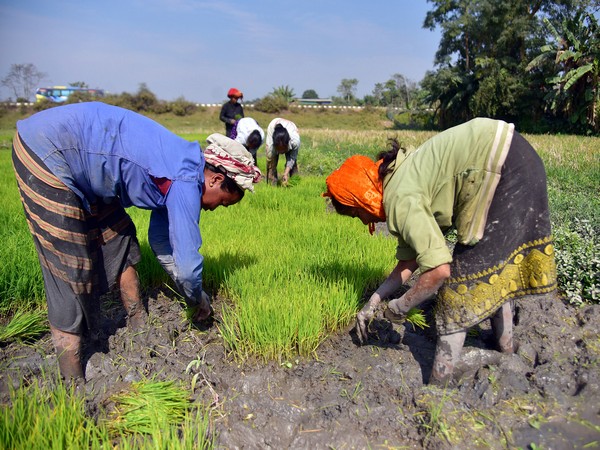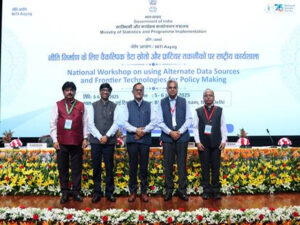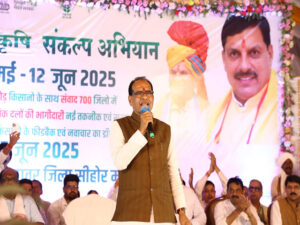Eleven years of empowering Indian Farmers rooted in philosophy of ‘Beej se Bazaar Tak’: MoAFW

New Delhi [India], June 7 (ANI): As the Prime Minister Narendra Modi-led government completes 11 years of governance, India’s agricultural sector has undergone a profound transformation over the years which is rooted in the philosophy of Beej Se Bazaar Tak (seed to market), while also championing inclusivity, supporting small farmers, women-led groups, and allied sectors, while making India a global agricultural leader, said a statement from the Ministry of Agriculture and Farmers Welfare (MoAFW).
PM Modi also highlighted today about ensuring prosperity of farmers and also focussing on issues like soil health and irrigation.
“It’s our privilege to serve our hardworking farmers. For the past 11 years, our various initiatives have boosted prosperity for farmers and also ensured an overall transformation of the agriculture sector. We have focussed on issues like soil health and irrigation, which have been greatly beneficial. Our efforts towards farmer welfare will continue with greater vigour in the times to come,” PM Modi said in a post on X earlier today.
Meanwhile, MoAFW’s statement read, “Above all, the mindset has shifted, Farmers are now recognised as key stakeholders and drivers of India’s growth. As India enters Amrit Kaal, its empowered farmers stand ready to lead the nation from food security to global food leadership.”
Highlighting the work done by the Modi-led government over 11 years of governance (since 2014), the Centre’s achievements have been shown under the campaign of ’11 years of Kisan Samman’ and ‘Viksit Bharat ka Amrit Kaal, Seva Sushasan, Garib Kalyan ke 11 saal’
A statement from MoAFW has highlighted that over the 11 years, the agri sector has seen enhanced budget allocation, including increased Food Grain Production, increase in MSP and Support for Farmers, Wheat, Paddy, MSP Growth and Record Procurement, financial security among other things.
“From modern irrigation and credit access to digital marketplaces and agri-tech innovations, India is embracing smart farming and reviving traditional practices like millet cultivation and natural farming. Allied sectors such as dairy and fisheries are also flourishing, driving rural prosperity and climate-smart agriculture,” the ministry said.
Regarding Budget allocation, the ministry said, “Agriculture serves as the backbone of India’s economy, playing a pivotal role in ensuring food security, providing employment, and contributing to overall economic development. It supports the livelihoods of a significant portion of the population and remains vital to India’s socio-economic fabric.”
The Budget Estimates for the Department of Agriculture and Farmers’ Welfare have seen growth, rising from Rs 27,663 crore in 2013-14 to Rs 1,37,664.35 crore in 2024-25, an increase of nearly five times over the period, the ministry said.
The country’s grain production has also grown steadily from 265.05 million tonnes in 2014-15 to an estimated 347.44 million tonnes in 2024-25.
“The major crops include rice, wheat, jowar, bajra, maize, ragi, barley, gram, tur, pulses, groundnut, soybean, rapeseed & mustard, oilseeds, sugarcane, cotton, and jute & mesta,” the statement read.
During the period 2014-15 to 2024-25, procurement of 14 Kharif crops was 7871 Lakh Metric Tonnes (LMT), while during the period 2004-05 to 2013-14, procurement was 4679 LMT.
Earlier in May, the Centre hiked Minimum Support Price (MSP) for certain Kharif crops for Marketing Season 2025-26, with over 16 crops seeing more than an 80 per cent of a jump in MSP since 2013-14.
According to the ministry, Paddy (Common) has seen an 81 pc jump, being at Rs 2369/quintal for 2025-25, up from Rs 1310/quintal in 2013-14. Paddy (Grade A) was increased by 78 pc, fixed at Rs 2389 per quintal for 2025, up from Rs 1345/quintal in 2013-14.
The MSP for wheat rose from Rs 1,400 per quintal in 2013-14 to Rs 2,425 per quintal in 2024-25
Jowar (Hybrid) and Jowar (Maldandi) has seen an increase of 147 per cent, being fixed at Rs 3699/quintal and Rs 3749/quintal respectively.
Bajra has seen a jump of 122 pc in MSP; Ragi 226 pc, Maize 83 pc, Tur/Arhar 86 pc, Moong 95%, Urad 81 pc, Groundnut 82 pc, Sunflower Seed 109 pc, Soybean (Yellow) 108 pc, Sesamum 119 pc, Nigerseed 172 pc, Cotton (Medium Staple) 108 pc, Cotton (Long Staple) 103 pc.
“A total of Rs6.04 lakh crore has been disbursed as MSP payments for wheat during 2014-2024, a substantial rise compared to Rs2.2 lakh crore paid during 2004-2014,” the ministry said.
Similarly for Paddy, the procurement has increased, at 7608 LMT during the 2014-15 to 2024-25, while during the period 2004-05 to 2013-14, procurement of paddy was 4590 LMT.
The government has also brought a turnaround in the pulses sector. Previously marked by low cultivation, limited procurement, high import dependence, and elevated consumer prices, the sector now exhibits increased cultivation, substantial procurement driven by higher MSPs, reduced import reliance, and improved price stability for consumers, the ministry said.
Procurement of pulses at Minimum Support Price (MSP) witnessed an increase of 7,350 pc, rising from 1.52 LMT during 2009-2014 to 82.98 LMT during 2020-2025.
Highlighting the steps taken for financial security, the PM-Kisan Samman Nidhi has transferred over Rs 3.7 lakh crore to more than 11 crore farmers, with a farmer-centric digital infrastructure ensures the transparent & direct delivery of benefits to farmers nationwide, eliminating middlemen.
The PM-KISAN scheme, a central sector scheme launched in February 2019, aims to supplement the financial needs of land-holding farmers. It provides Rs6,000 per year in three equal instalments directly into Aadhaar-seeded bank accounts through Direct Benefit Transfer (DBT).
Similarly, the Kisan Credit Card Scheme (KCC) which aims to provide a hassle-free and affordable credit to farmers for short- and long-term cultivation, post-harvest expenses, and consumption needs by giving easy access to credit for agriculture and allied sectors has provided Rs 10 lakh crore of credit to 7.71 crore farmers.
On reducing risk in the sector and increasing resilience, Pradhan Mantri Fasal Bima Yojana (PMFBY), launched in 2016, aims to provide a simple, affordable, and comprehensive crop insurance product to Indian farmers. This scheme covers all non-preventable.
Over 63 crore farmer applications enrolled under the scheme and Over 19.91 crore farmers (provisional) have received insurance claims and Rs 1.75 lakh crore have been paid out in (provisional) claims.
The ministry also highlighted various other schemes which have been launched, like Pradhan Mantri Krishi Sinchayee Yojana, Soil Health cards.
Whereas on modern infrastructure of agriculture, the ministry mentioned Agriculture Infrastructure Fund (AIF), PM Kisan Samriddhi Kendras, e-NAM & Market Reform and Mega Food Parks and how they have grown over the years.
On innovation and entrepreneurship, the ministry mentioned its various initiatives such as NAMO Drone Didi, AgriSURE, Diversifying Farmer Incomes and how food processing sector has become a key driver in farmers income growth.
Moreover, achievements in various agricultural sectors, such as the blue revolution, which has made India as the second largest fish producing country with around 8 pc share in global fish production; Sweet Revolution and the Dairy sector were also highlighted. (ANI)
This story is not been edited by Take One Television & Digital Network Staff and is auto-generated from syndicated feed






